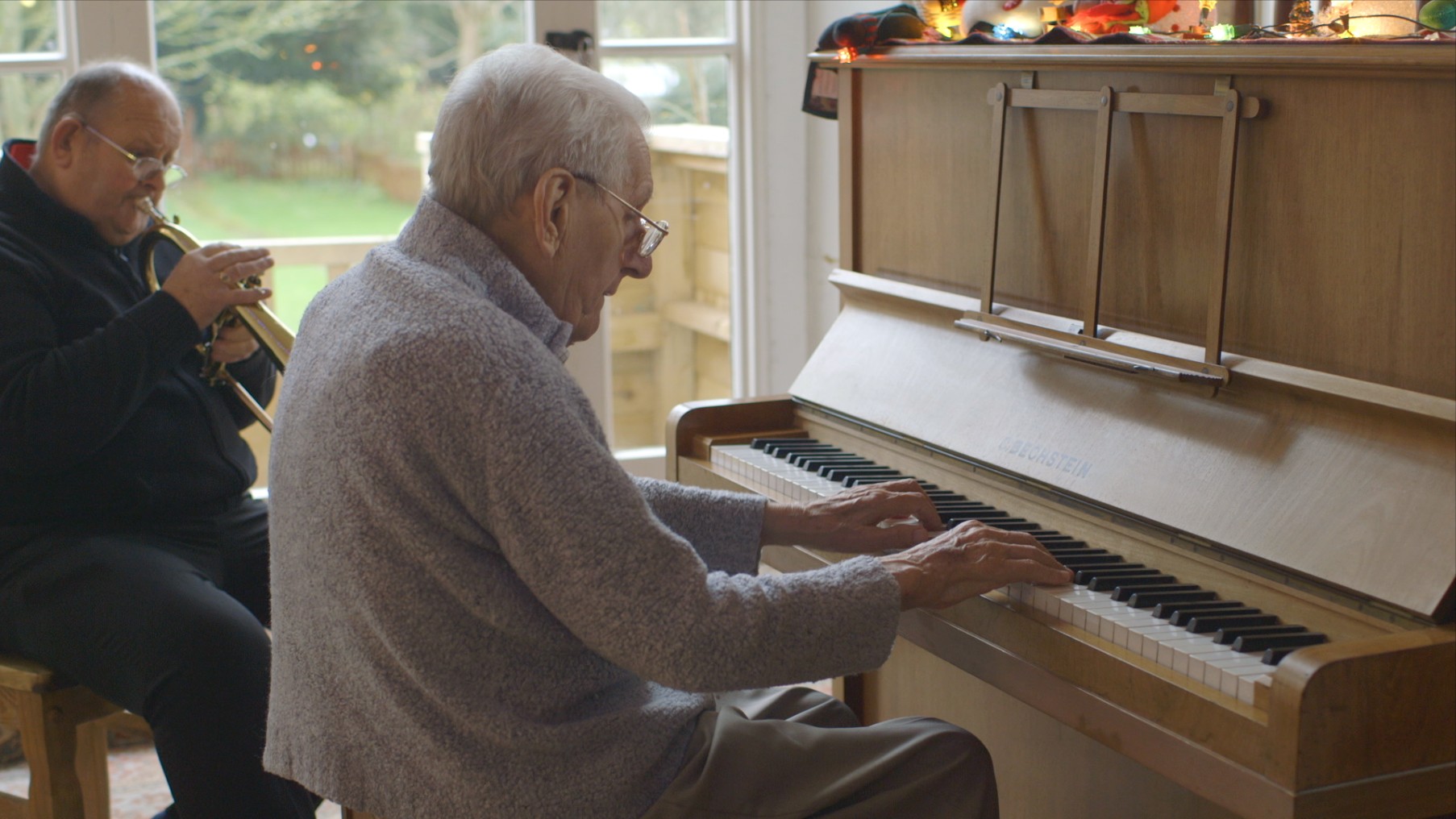Last month – like a lot of people, probably – I found myself feeling stressed. The news was especially panic-inducing. I had to find a new flat within the space of two weeks. My laptop had stopped working before an important deadline. My bank balance was trickling into nothingness. And all of these things had built up, gradually, like a slow-cooked piece of meat, but with a really horrible marinade.
Advertisement
I dealt with this in the usual ways: chain-smoking, scrolling through Instagram instead of talking, staring out my bedroom window like a teenager who’s just had an argument with their parents. But then I tried something different, after a recommendation from a friend. Healing frequencies. On YouTube. There are hundreds and hundreds of them. Each of them claiming variously vague yet positive-sounding benefits, from “DNA repair” to “cleansing infections” to something called, er, the “miracle tone.”If you've never studied music, or looked deep into this stuff online, a frequency is basically the rate per second of a vibration constituting a sound wave. We measure these sound waves in 'hertz' (or Hz). Healing frequencies, then, are a specific scale of hertz which were apparently used by monks in Gregorian times during meditation. Jaden Smith made a whole album around this concept. You don't need to read about that right now though. You just need to know that there's some music online, and it's supposed to heal you.And so, one evening, I laid down on my bed, under the soft glow of a pink Himalyan salt lamp, and listened to these healing frequencies for an hour or two without interruption in the hope they might make me feel better (I started with this 432Hz "miracle tone", obviously, because who doesn't want miracles). At first I felt antsy, resisting the urge to check my phone or get up and make toast. But after a while, I gave into the soft, generous lull. Gradually, all the angst from the past few days started to feel less acute. And by the time I got up from my bed, limbs like spaghetti, it was barely there at all.
Advertisement
But ‘feeling less stressed’ isn’t directly the same as ‘healing’, is it? And perhaps it wasn’t the healing frequencies that made me feel better, but instead the act of taking time for myself and slowing down for once. That said, the notion that music – or sound – can heal us isn’t as outlandish or new age hippy as it seems. It's a complex issue, though, one that goes waaay beyond healing frequencies, and that people still debate in the fields of science, psychology and therapy today. It doesn’t help that many have different ideas of what ‘healing’ actually means in the first place.Shanna Lee, who works as a life coach in California, thinks “frequencies” are fundamental to the way we live our lives, and the use of sound can tap into that. “We are energy at our core. We have energetic interactions going on our bodies. And if we want to understand how to improve health, we need to understand how we’re interacting with frequencies,” she says over FaceTime. “There are two frequencies that the body resonates very well with, one is 432Hz and one is 444Hz, and they harmonise the patterns of our bodies. There are also certain tunings – 396, 417, 528, 639, 741, 852 – which do different things. So, 396 works a lot with the emotional plain, and with grief. 639 can affect our connections with others, and so on.”All of this sounds very appealing, and like something I could probably lowkey get into once my tarot card obsession runs dry, but I also feel skeptical. I ask Shanna whether there’s any science to back these claims up. “The scientific community are really starting to step into this,” she says. “There was a study back in September 2013 looking at 'non-auditory' cells in the body, which are being affected by music. And it used to be believed that music would evoke emotions, and that those emotions would create changes in our cellular structure. But what they were finding in the study is that non-auditory cells were basically changing fluid pressure based on these sound waves. So that was a breakthrough from a scientific standpoint.”
Advertisement
Proponents of the research that Shanna cites basically say that because sound is a mechanical wave, it causes perturbation in a medium (in other words: it affects physical stuff). Water, especially, is a good conductor of sound. And because water is the main component of cells and bodily fluids, we are also likely to be affected by sound, physically. “There was another study in June 2016,” Shanna continues, “and they were looking at how music alters cell viability and cell motility in non-auditory cells. What they did is they looked at both cell death and cell growth. And the fascinating thing is that ‘dissonant’ noises can cause cell death, and 'resonate' sounds, like 432Hz, can have a positive impact on our cells.”But not everybody who works with sound in a ‘therapeutic’ or ‘healing’ capacity agrees with Shanna’s views on the mind and body. Lyz Cooper, who has been running The British Academy of Sound Therapy for almost 25 years, tells me that until six or seven years ago, she was also using healing frequencies to help clients. However she gradually moved away from this methodology, feeling it rested on shaky ground. “There’s not, at the moment, much evidence based on certain frequencies being particularly healing,” Lyz says, over the phone. “What we can prove, if you like, is how our mind, body and emotions respond to sound. So that’s when our research moved away from the ‘energy medicine’ side of things, and more into ‘sound psychology’.”
Advertisement
But is ‘sound psychology’ that much different from all this other stuff? Some of the language around these concepts feel similarly vague to me, a skeptical outsider. I ask Lyz to expand. “Low sounds relax us and high pitches tend to stimulate us,” she says, explaining how they use a huge array of instruments and techniques at the academy. “So if you’re working on someone with anxiety, you’ll use certain instruments and play certain pitches to help them relax. How it works is based on the way we’ve evolved to respond to sound in different ways. The reason we find higher pitches energising is because they call us to attention. It’s based on animal calls. Like when you stub your toe, you’re going to go ‘ow!’ So we use that ancient, primal programming.”Whether you believe in healing frequencies or the ancient primal programming of the brain doesn’t really matter – if something makes you feel better, it makes you feel better, regardless of whether rigorous and undisputed research-based evidence backs it up. Plenty of claims may lack scientific data, but that doesn’t necessarily mean they should be dismissed. One look at the lack of research around PMDD, or male contraception, as a random example, show us how we shouldn’t always look towards the scientific community in our quest for answers and results – but we shouldn’t ignore it either. Lyz sums it up nicely: “There is a lot of pseudoscience out there. But it’s important to have different approaches and to be open-minded, but also to be grounded.”
Advertisement

Unlike the work of Lyz and Shanna, Chelsea’s focus is less on the direct, physical effect of music itself, and more on how music making can benefit people in a multitude of tailored ways. “People often talk about music therapy as being a non-verbal equivalent of talking therapy for people for whom words are too much, or or too little, or not available,” Grace continues. “Music therapy works with a whole range of instruments, from the voice and the body, through to percussion, hand held instruments, digital equipment… so it uses a whole spectrum of music-making possibilities.”In terms of positive results, Grace says it depends on a person's aims and needs, but that music therapy can be a very effective alternative to other therapies. “For example, with a child with a disability, it might be about helping their motor skills with a physiotherapist, and they’ll create a structured programme where they’re working with specific movements and music that helps them practice those exercises,” she says. “And for people with dementia, what we find is that communication is drastically affected by the progression of the disease. What music affords is another way in which people can communicate through non-verbal means.”So on the question of whether music can heal us, the answer is… yes and no and maybe. It would be irresponsible to claim that banging a YouTube video titled "DNA repair" out some massive speakers is going to reverse a terminal cancer diagnosis. But the effect that music can have on the body – whether in a meditative capacity, or through music therapy – is clearly positive in a variety of proven ways. And though I don't necessarily buy into the idea that healing frequencies are fundamentally altering my body cells, I don't not believe it either. And if I feel like shit anytime soon, you'll probably find me turning up some miracle tone in my bedroom because why not? You never know.You can follow Daisy on Twitter.
